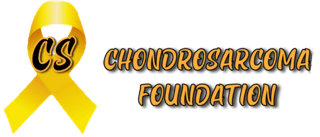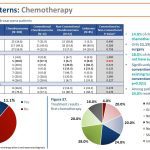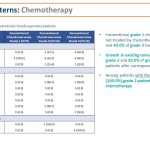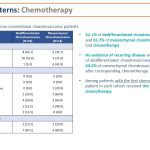Patient Registry shows mixed results for using chemotherapy non-conventional CS patients
Chondrosarcoma Patient Registry Examines Self-report Results of Traditional Chemotherapy.
The Chondrosarcoma Foundation was the first foundation to be inducted into the NORD IAMRARE Patient Registry 2.0 platform. Since our launch on March 1, 2023 we have had over 230 CS Patients participate in the registry and we are reporting the results of our first full data analysis from the data collected from 169 participants who completed all of the surveys in the registry. This is the first global Natural History Study addressing Chondrosarcoma. For the past eight weeks we have been sharing our findings (one result at a time) to help both the sarcoma / oncology medical profession and the CS patient community understand and use these results towards developing better protocols, practices / interventions as well as better research and clinical trials.
For chondrosarcoma patients, caregivers and families, we want them to be aware of their treatment options as well as the reported effectiveness of their treatment options. This is data collected as self-reports from fellow chondrosarcoma patients and caregivers and they are keenly aware of their health and well-being through their journey. We are grateful to all who have shared their stories and those who choose to participate in the registry.
We have looked at the need for CS patients to fully understand their Chondrosarcoma sub-type, address misdiagnosis, recurrence, metastasis, and examine the outcomes of surgery., radiation and immunotherapy. This week we examine traditional chemotherapy.
Results of Traditional Chemotherapy: Although the literature has indicated that traditional chemotherapy is not effective in treating chondrosarcoma, it was self-reported that chemotherapy was used with 25 chondrosarcoma patients (14.8%) with the following breakdown: (n=0 conventional Grade 1; n=3 conventional Grade 2; n=4, conventional Grade 3, n=8 Dediffereniated, n=5 Mesenchymal; n=5 for all other sub-types). For conventional chondrosarcoma patients 66.7% of Grade 2 and 50% of Grade 3 patients reported growth in existing tumors. Two patients diagnosed as conventional grade 2 reported shrinkage of existing tumors, no positive results for Grade 3. In contrast dedifferentiated chondrosarcoma patients n=8 out of 19 or 42.8% reported having chemotherapy and 50% reported no evidence of recurring disease, two patients reported no evidence of any additional tumors and one patient reported shrinkage of existing tumors. For mesenchymal chondrosarcoma, n= 5 out of 14, three patients reported no evidence of recurring disease and the other two patients reported shrinkage of existing tumors.
Conclusions: We want to emphasize that it is very difficult to make any definitive conclusions about chemotherapy because only a small group of chondrosarcoma patients (25 out of 169) reported being treated with it and we need to obtain more data before we can draw any conclusions. With that said based, on this first set of data in the patient registry, we need to take a closer look at the effectiveness of chemotherapy in the aggressive non-conventional sub-types, specifically Dedifferentiated and Mesenchymal CS. It appears that the existing literature may be correct for patients diagnosed with conventional chondrosarcoma where 50-60% report growth in existing tumors. However, in contrast, patients diagnosed with Dedifferentiated or Mesenchymal chondrosarcoma may benefit from chemotherapy with most of the patients reporting they had positive results.
Your participation is essential. Be A Part of the Chondrosarcoma Patient Registry.
To Register: https://chondrosarcoma.iamrare.org/
It is not too late to sign up to participate in the Chondrosarcoma Patient Registry. The register is open at any time for CS Patients or Caregivers to go on-line and complete 9 surveys which will take less than an hour to complete. We need you to share your journey and help progress research in chondrosarcoma.
The Chondrosarcoma Patient Registry creates a platform for patients around the world to strengthen their voices and share information about this rare bone cancer. This global resource will provide data for researchers to use to advance drug development and treatment options and help improve patient care. The patient information that the registry collects will help give direction to scientists on areas in which to focus their research efforts, and to hopefully allow clinicians to see trends in patient responses to treatment for chondrosarcoma. The hope for the future is to illuminate treatments that have had some success that may become the standard of care for this rare bone cancer.



